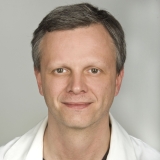
Department of Obstetrics and Gynecology (Division of Obstetrics and Feto-Maternal Medicine)
Position: Associate Professor
T +43 1 40400 28420
martin.knoefler@meduniwien.ac.at
Keywords
Cell Biology; Cell Differentiation; Decidua; Endometrium; Hypertension, Pregnancy-Induced; Molecular Biology; Placenta; Pregnancy; Trophoblasts; Uterine Artery
Research group(s)
- Reproductive Biology Unit
Head: Martin Knöfler
Research Area: biological function, differentiation and development of the human placenta
Members:
Research interests
Correct placental development is crucial for successful pregnancy and fetal wellbeing. Progenitor cells of the placenta, the cytotrophoblasts (CTBs), provide the basis for 2 different routes of differentiation. In floating villi embedded in maternal blood, CTBs fuse and generate the multinucleated syncytium while CTBs on the tips of villi attached to the uterus proliferate and subsequently detach to invade the maternal tissue. Failures in each of the two processes are accompanied with severe pregnancy complications. Our research focusses on understanding the mechanisms behind these processes in particular to unravel signaling routes involved in invasive differentiation. Throughout the years different trophoblast model systems including first trimester villous explant cultures, isolated primary trophoblasts and cell lines were established to investigate regulatory mechanisms controlling trophoblast differentiation. Thus, we could identify members of Wnt and Notch signaling among others to be critically involved in correct trophoblast invasion. Recently, also an in vitro model for pregnancy-specific differentiation of the endometrium has been established to study the process of decidualization. Hence, we are able to explore all parts of the feto-maternal interface.
Techniques, methods & infrastructure
Besides standard molecular an cell biology techniques such as Western blotting, semi-quantitative/real-time PCR, ELISA, flow cytometry, immunofluorescence of sections and cells, my lab is specialized in isolating/cultivating pure primary cell cultures as well as tissue cultures (explant system). We have a longstanding experience in transfecting/manipulating also non-dividing primary cells using electroporation, viral transduction or CRISPR-Cas9 genomic editing. Moreover, we have a laser-captured micro-dissection facility with experienced staff.
Grants
- Co-activators in extravillous trophoblast differentiation (2015)
Source of Funding: FWF (Austrian Science Fund), Stand-Alone Projects
Principal Investigator - Zelluläre Seneszenz in Trophoblasten der humanen Plazenta (2015)
Source of Funding: OeNB (Oesterreichische Nationalbank), Anniversary Fund
Principal Investigator
Selected publications
- Otti, G.R. et al., 2014. Notch2 Controls Prolactin and Insulin-Like Growth Factor Binding Protein-1 Expression in Decidualizing Human Stromal Cells of Early Pregnancy J.-W. Jeong, ed. PLoS ONE, 9(11), p.e112723. Available at: http://dx.doi.org/10.1371/journal.pone.0112723.
- Meinhardt, G. et al., 2014. Wnt-Dependent T-Cell Factor-4 Controls Human Extravillous Trophoblast Motility. Endocrinology, 155(5), pp.1908-1920. Available at: http://dx.doi.org/10.1210/en.2013-2042.
- Haider, S. et al., 2014. Notch Signaling Plays a Critical Role in Motility and Differentiation of Human First-Trimester Cytotrophoblasts. Endocrinology, 155(1), pp.263-274. Available at: http://dx.doi.org/10.1210/en.2013-1455.
- Knöfler, M. & Pollheimer, J., 2012. IFPA Award in Placentology Lecture: Molecular regulation of human trophoblast invasion. Placenta, 33, pp.S55-S62. Available at: http://dx.doi.org/10.1016/j.placenta.2011.09.019.
- Knöfler, M., 2010. Critical growth factors and signalling pathways controlling human trophoblast invasion. The International Journal of Developmental Biology, 54(2-3), pp.269-280. Available at: http://dx.doi.org/10.1387/ijdb.082769mk.